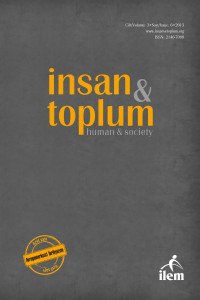Öz
Takriben iki asırdır süregiden ve zaman içinde geçmişle radikal kopuşlara sahne olan modernleşme tecrübesinin yapısal bir sonucu olarak bugün Türkiye felsefe ve sosyal bilim çalışmalarının Batımerkezli bir bilgi üretim minvaline tabi olduğu vakadır. Bu kurumsal ve söylemsel meselenin arkasında cevaplanmayı bekleyen bir soru yatar: “Batı” denilen muhayyel coğrafi-tarihî yer ve zamanda üretilen bir kavram, bir teknik veya bir kurumun kullanılması kategorik olarak bağımlılık ve taklit anlamına gelir mi? Bu makale, bu meseleden yola çıkarak bilgi meselesinin tarih tasavvuruyla nasıl yakından alakalı olduğunu göstermeye ve bugün müesses bir yapısal mecburiyet olarak maruz kalınan Avrupamerkezci tarih anlatısını ve meşru bilginin kaynağına dair modernist önkabulleri sorgulamaya açmayı amaçlamaktadır. Tarih ve bilgi, sahih bir failliğin kendisini kurduğu zeminin birbirini açıklayan ve işaret eden başlıca iki mevzudur. Türkiye’ye özgü bir bilgi üretim alanı, ancak “Doğu-Batı” gibi siyaseten kurgulanmış temsiller bir kenara bırakılarak tarih meselesini Avrupamerkezcilikten azade bir minvalde düşünmekle mümkün olabilir.
Anahtar Kelimeler
Avrupamerkezcilik Tarih Tasavvuru Garbiyatçılık Osmanlı-Türk Modernleşmesi Episteme
Kaynakça
- Ahıska, M. (2005). Radyonun sihirli kapısı. Garbiyatçılık ve politik öznellik. İstanbul: Metis Yayınları.
- Amin, S. (1993). Avrupamerkezcilik. Bir ideolojinin eleştirisi. İstanbul: Ayrıntı Yayınları.
- Badiou, (2011). Tarihin uyanışı. İstanbul: Monokl Yayınları.
- Bernasconi, R. (2011). Irk kavramını kim icat etti? İstanbul: Metis Yayınları.
- Blaut, J. M. (2000). Eight Eurocentric historians. New York: Guilford Press.
- Blaut, J. M. (2012). Sömürgeciliğin dünya modeli: Coğrafi yayılmacılık ve Avrupamerkezci tarih. İstanbul: DergâhYayınları.
- Cansever, T. (2012). Kubbeyi yere koymamak. İstanbul: Timaş Yayınları.
- Chakrabarty, D. (2012). Avrupa’yı taşralaştırmak. İstanbul: Boğaziçi Üniversitesi Yayınevi.
Öz
It is a well-known fact that studies in philosophy and the social sciences in Turkey are mostly subjected to a western-centered way of producing knowledge as a result of the modernization process that has proceeded for nearly two centuries and has witnessed some radical structural breaks with the past. Behind this institutional and discursive issue lies a question to be answered: Does any use of a “Western” produced concept, technique or institution, or, in other words, any vehicle of epistemological production hailing from “West” an imaginary historicogeographic space and time, mean categorical dependency or imitation? Taking this question as its point of departure, this article aims to show how the question of knowledge is closely related to the conception of history, and to inquire into the modernist presumptions regarding the source of legitimate knowledge as well as the Eurocentric narration of history that structurally imposes itself in all intellectual institutions. History and knowledge are two main issues that reveal the existential ground on which an authentic agency may constitute itself. A field of intellectual production peculiar to Turkey is possible only by going beyond the politically constructed representations such as “East-West” and thinking through the question of subjectivity in a non- Eurocentric sense of history.
Anahtar Kelimeler
: Eurocentrism Conceptionof History Occidentalism Ottoman-Turkish Modernization Episteme
Kaynakça
- Ahıska, M. (2005). Radyonun sihirli kapısı. Garbiyatçılık ve politik öznellik. İstanbul: Metis Yayınları.
- Amin, S. (1993). Avrupamerkezcilik. Bir ideolojinin eleştirisi. İstanbul: Ayrıntı Yayınları.
- Badiou, (2011). Tarihin uyanışı. İstanbul: Monokl Yayınları.
- Bernasconi, R. (2011). Irk kavramını kim icat etti? İstanbul: Metis Yayınları.
- Blaut, J. M. (2000). Eight Eurocentric historians. New York: Guilford Press.
- Blaut, J. M. (2012). Sömürgeciliğin dünya modeli: Coğrafi yayılmacılık ve Avrupamerkezci tarih. İstanbul: DergâhYayınları.
- Cansever, T. (2012). Kubbeyi yere koymamak. İstanbul: Timaş Yayınları.
- Chakrabarty, D. (2012). Avrupa’yı taşralaştırmak. İstanbul: Boğaziçi Üniversitesi Yayınevi.
Ayrıntılar
| Birincil Dil | Türkçe |
|---|---|
| Bölüm | Araştırma Makaleleri |
| Yazarlar | |
| Yayımlanma Tarihi | 1 Aralık 2013 |
| Yayımlandığı Sayı | Yıl 2013 Cilt: 3 Sayı: 6 |


